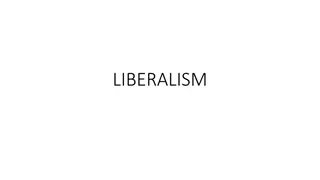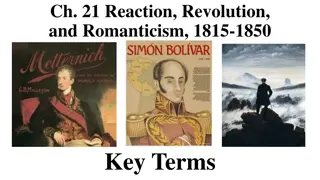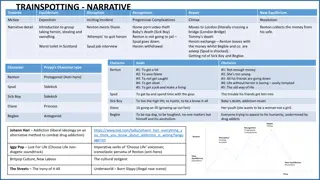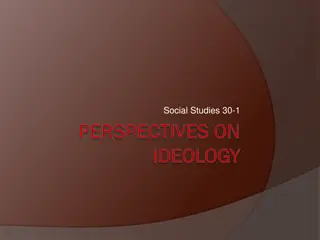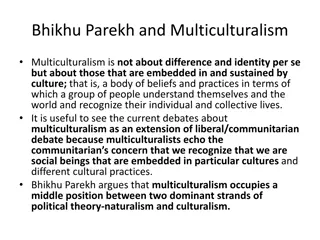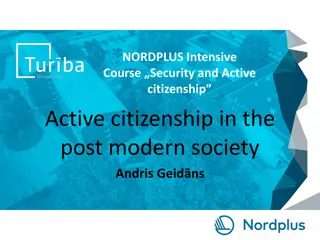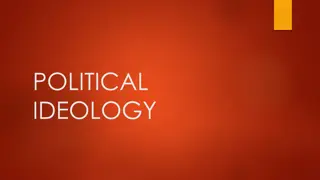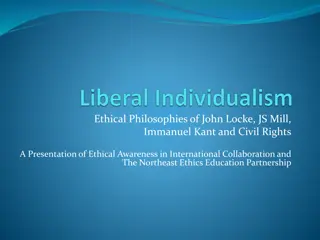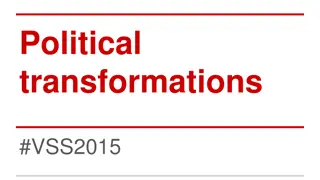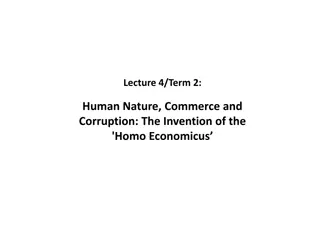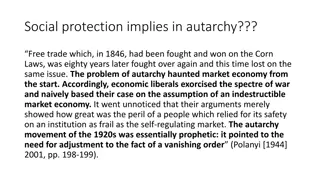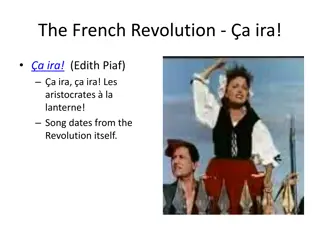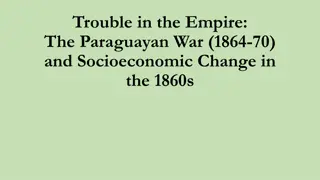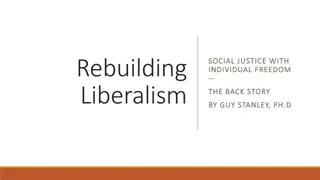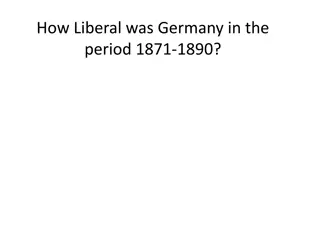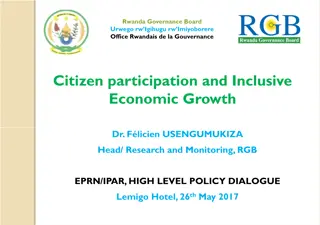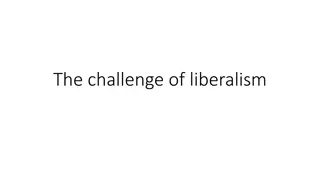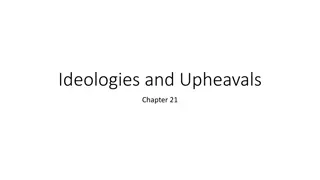Social Studies Notes : Ch. 22 & 23
Explore significant historical events and ideas such as nationalism, industrialism, and political reform. Learn about influential figures like Marie Curie, James Watt, and Simon Bolivar. Understand the impact of the Industrial Revolution and the French Revolution on society. Discover the connections
4 views • 30 slides
Understanding Liberalism: Key Ideas and Historical Context
Liberalism, a prominent political ideology, emerged in the 19th century and is closely linked to capitalism. It stands against absolutism and feudal privileges, advocating for individualism, freedom, reason, equality, toleration, consent, and constitutionalism. The evolution of liberalism emphasized
1 views • 18 slides
Key Terms in Ch. 21: Reaction, Revolution, and Romanticism, 1815-1850
The key terms discussed in Chapter 21 include principle of legitimacy, balance of power, ideology, conservatism, principle of intervention, ultraroyalists, ministerial responsibility, and liberalism. These terms highlight important political philosophies and concepts during the post-Napoleonic era a
0 views • 17 slides
Exploring Ideology and Narrative in Trainspotting
A deep dive into the narrative structure and ideological themes of the film Trainspotting, examining character goals, obstacles, and the protagonist's journey through addiction and self-discovery. The film's portrayal of addiction, socialism, liberalism, and post-Thatcherite counter-culture is explo
1 views • 7 slides
Understanding Ideology and Society: Perspectives and Beliefs
Explore the significance of ideology in shaping societal perspectives, beliefs, and values. Understand the impact of ideologies on laws, societal structures, and individual behavior. Delve into concepts such as liberalism, individualism, and collectivism to gain insights into human societies through
4 views • 26 slides
Challenges of Multiculturalism in Liberal Political Theory
Bhikhu Parekh discusses multiculturalism as a middle ground between naturalism and culturalism in political theory. He highlights the importance of cultural plurality in contemporary liberalism, critiquing the assimilationist approach. He addresses the challenges multiculturalism poses for liberals,
0 views • 9 slides
Exploring Active Citizenship, Responsibility, and Social Contracts in Modern Society
Dive into the dynamics of active citizenship and responsibility, examining the role of religion, liberalism, and social contracts in shaping societal structures. From the collapse of traditional worldviews to John Locke's theories on religion and society, explore the philosophical underpinnings that
0 views • 10 slides
Understanding Political Ideologies: Liberalism and Conservatism Explained
Political ideologies shape beliefs about the role of government and societal balance between the public and private sectors. Liberalism focuses on individual liberty and government intervention for equality, while conservatism emphasizes limited government, traditional values, and free markets. Psyc
0 views • 25 slides
The Legacy of Robert Burns: Scotland's National Poet
Robert Burns, also known as the Bard, was a significant figure in Scottish literature, representing Pre-Romanticism with his exploration of emotions and folk literature. His enduring appeal led to his influence on liberalism and socialism. Burns collected and adapted folk songs, with "Auld Lang Syne
0 views • 16 slides
Ethical Philosophies of John Locke, JS Mill, Immanuel Kant, and Civil Rights
This presentation explores the ethical philosophies of John Locke, JS Mill, and Immanuel Kant, focusing on individual rights, moral autonomy, and the principles of classical liberalism. It discusses the influence of these philosophers on research ethics, emphasizing the protection of individual huma
0 views • 48 slides
Transformation of Central Europe: V4 Success and Economical Factors
Vaclav Havel's vision for transforming Central Europe politically in 1990 set the stage for the success of the Visegrad Group (V4) nations. The V4 countries experienced remarkable GDP growth and turned into significant economic powers. The transition involved embedded liberalism, shock therapy, and
0 views • 16 slides
The Evolution of Liberal Economic Thought: Friedrich Hayek and Adam Smith
The lecture delves into the concept of 'Homo Economicus' and the ideas of Friedrich Hayek and Adam Smith regarding individualism, liberalism, and economic freedom. It discusses how Hayek praised Smith's contribution to liberalism and the significance of securing individual freedom. The Acts of Union
0 views • 20 slides
The Evolution of Social Protection and Free Trade
Social protection and free trade have been intertwined throughout history, with battles over autarchy and market economies. Economic liberalism faced defeats in the past due to illusions and challenges in adapting to changing economic landscapes. The concept of autarchy has been prophetically signif
0 views • 38 slides
The French Revolution: A Catalyst for Modern Transformation
The French Revolution, a historical turning point, challenged traditional authority structures and introduced ideologies like liberalism, republicanism, and socialism. This era of societal upheaval posed questions about the nature of power and governance, leaving a complex legacy that continues to i
0 views • 39 slides
Socioeconomic Transformations and the Legacy of the Paraguayan War (1864-70) in Brazil
The content delves into the turbulent times of the Paraguayan War and its aftermath in Brazil during the 1860s. It explores the socioeconomic changes, political dynamics, and demographic shifts that shaped the era, highlighting the impact of the war on Paraguay and the region. The narrative unfolds
0 views • 12 slides
Enhancing Reflective Practice Through Critical Reflection and CLD Values
Explore the synergies between reflective practice, critical reflection, and CLD values in professional development for Community Education professionals. Learn how CLD values can support critical reflection in the face of challenges like Neo-liberalism and New Managerialism, ultimately enhancing pro
0 views • 28 slides
Rebuilding Liberalism: Social Justice with Individual Freedom
The book "Rebuilding Liberalism" by Guy Stanley, Ph.D., challenges neo-liberalism's laissez-faire approach and emphasizes the importance of civil society in achieving social justice and individual freedom. It outlines how the state influences markets, money, and law, and highlights the need for demo
0 views • 20 slides
Germany's Liberalism Debate 1871-1890
Germany in the period 1871-1890 experienced a blend of liberal and conservative elements, with a prevailing conservatism. The debate centers on whether this period marked a shift from a predominantly liberal to a predominantly conservative state, despite the presence of democratic politicians and ob
0 views • 48 slides
Importance of Inclusive Economic Growth and Governance in Rwanda
Inclusive economic growth is crucial as it offers economic opportunities and equal access, enhancing poverty reduction efforts. Societies thrive when based on equality, promoting better development outcomes. The qualities of government for economic growth encompass economic liberalism, democratic pa
0 views • 28 slides
Exploring the Challenge of Liberalism in Kenya
Delve into the complexities of liberalism in Kenya, examining its latent presence, historical roots, and impact on religious beliefs. Explore the echoes and trends within churches influenced by cultural shifts, postmodernism, and spiritual warfare, while navigating the blurred lines between traditio
0 views • 21 slides
Ideologies and Upheavals: Congress of Vienna and Impact
The Congress of Vienna, a gathering of key European powers, aimed to establish lasting peace after Napoleon's defeat. Key agreements included territorial compensation, restoration of monarchs, and the formation of the Holy Alliance. While successful in preventing major wars, the Congress lacked fore
0 views • 19 slides

